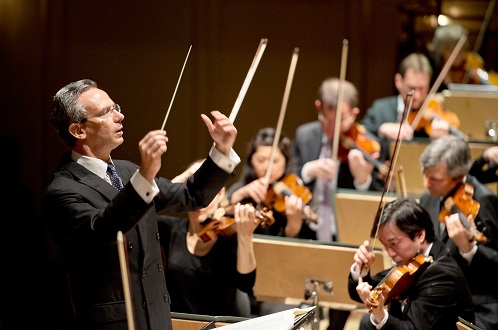 Switzerland Beethoven: Beatrice Rana (piano), Philharmonia Zurich / Fabio Luisi (conductor), Zurich Opera House, 14.7.2019. (JR)
Switzerland Beethoven: Beatrice Rana (piano), Philharmonia Zurich / Fabio Luisi (conductor), Zurich Opera House, 14.7.2019. (JR)

Beethoven – Piano Concerto No.1 Op.15; Symphony No.3 (‘Eroica’) Op.55
On the very last day of the opera house season, General Music Director Fabio Luisi brought us an all-Beethoven concert, a year ahead of the inevitable whole year of 250-year birthday anniversary celebrations. There was much to admire in this enjoyable concert. The orchestra (named the Philharmonia Zurich for better marketing purposes) was brought out of the pit, onto the stage, for their moments in the limelight.
First, though, it was time for the soloist to shine. This was my first chance, but certainly not my last, to see and hear young Italian pianist Beatrice Rana; reviews of her Proms debut in 2017 and Wigmore Hall recital a few months ago were glowing in praise. I would probably have preferred to hear her in a more mature, a more substantial Beethoven piano concerto than his First, something less in the shadow of Mozart (actually, Beethoven wrote the Second before the First – he just gave the First to the printers first). Beethoven himself wrote to his publishers Breitkopf & Härtel that his first two piano concertos were not of the finest order.
Rana gave us a very thoughtful and sensitive performance to please the ear. She started the opening movement with the very lightest of touch, but then, as the movement progressed, it was clear there would be no denying her technical skills. She was particularly attentive to tone colour, this being intelligent playing of the highest order, remarkable for one so young: she is still only 26. Rana let the music unfold gracefully; she is not going to be a tub-thumper. The slow movement also benefitted from the most delicate of openings, which kept the audience’s attention rapt. In the final movement, some of the phrasing sounded remarkably almost jazz-like. Rana and Luisi were always closely attuned, Rana looking every inch Luisi’s protégée – she has recently performed this concerned in Tokyo with the NHK Symphony Orchestra under Luisi’s baton. This is a young artist who is already a very fine pianist; her experience and interpretations can only grow with time.
After the interval, the ‘Eroica’. With the enlarged orchestra taking up the first rows of the Stalls, the sound was immediate and filled the whole hall (Zurich’s opera house is small, a mere 1,100 seats – the Met is four times the size). Vigorous conducting by Luisi kept the work flowing, Luisi always looking to bring out dissonances to remind us how progressive this work must have seemed at the time (1803) to a 19th century audience weaned on Haydn and Mozart. Beethoven’s first two symphonies are somewhat unadventurous, but his Third broke many boundaries.
The orchestra was swelled with many freelance outsiders, particularly in celli and double basses. One or two musicians stood out: principal oboist Bernhard Heinrichs shone like a beacon whenever he played; his fellow woodwind were a mite colourless in comparison. Principal cellist Lev Sivkov was a joy to watch and hear, he was attentive to all around him to keep his cello section in time. In the grandiose Funeral March there was very neat dove-tailing by the cello section with the violas. The stand-in timpanist, Mihaela Despa, was first-rate and garnered much applause.
The horns fared quite well in their exposed contribution to the jaunty Scherzo and, in the Finale, there was plenty of heroic heft from the brass for the coda, sending both the audience and the orchestra away on a musical high note for well-earned summer holidays (for some, a final performance of Elektra in the evening still to come).
Luisi proved yet again how important it is to keep an opera orchestra on its symphonic toes, something his successor (from 2021) Gianandrea Noseda will certainly be keen to continue.
Luisi left the stage wishing all a happy summer. For us, until the Lucerne Festival starts at the end of August, we shall have to console ourselves with the passive though admirable pleasures of listening to the Proms on BBC Radio 3.
John Rhodes